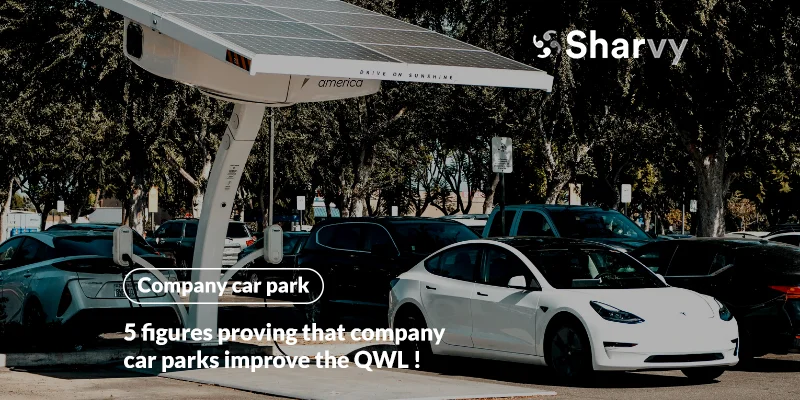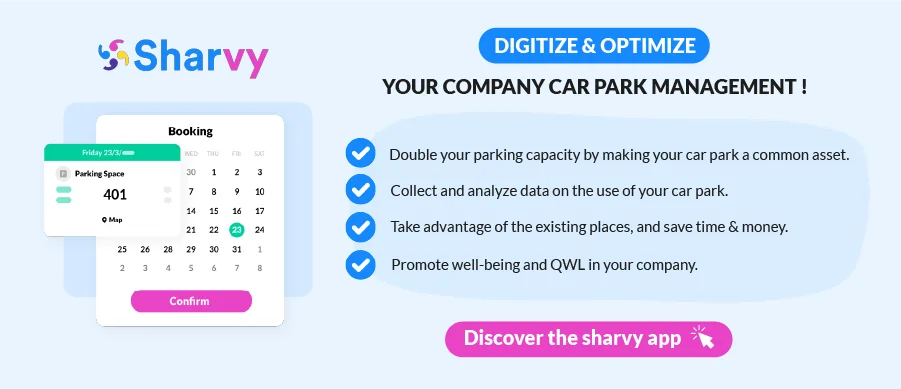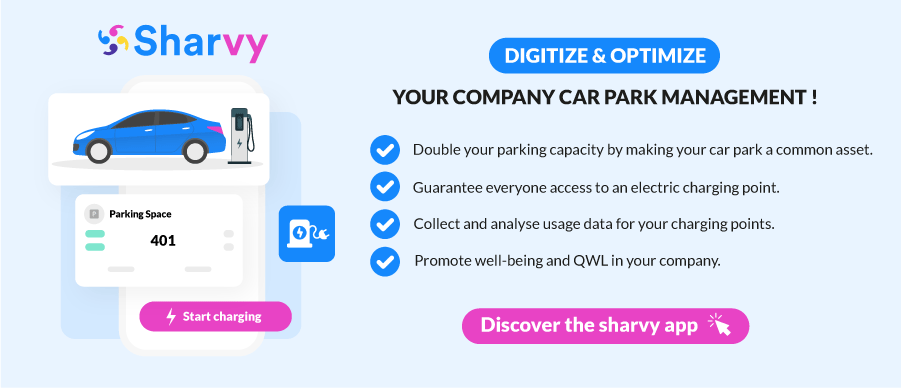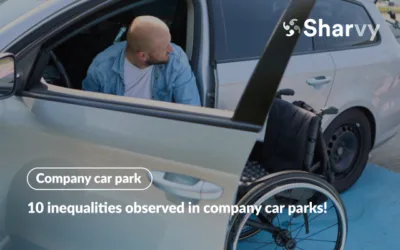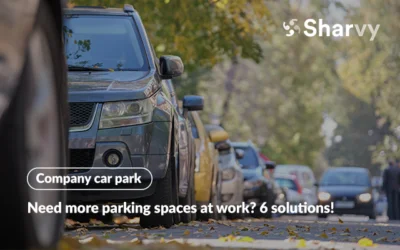Both surprising and legitimate, the relationship between company car parks and Quality of Life at Work (QWL) is now at the forefront of discussions between the company and its employees.
And with good reason : the problems associated with home-work commute are familiar, and they’re getting worse : increased road congestion, parking restrictions, higher charges, uncertainty about finding a parking space, etc.
However, the fact remains that the new generations are refusing to make the commute to work too restrictive! On the contrary, they see well-being and quality of life as decisive criteria when looking for a job. For them, this is a negotiating factor in its own right.
This is why companies need to act on their employees’ mobility practices. On the one hand, to build loyalty and expand their talent pool. But, it is also an essential lever for QWL, CSR, and the employer brand.
But, how can you have a lasting impact on your employees’ mobility practices? Focus on company car parks and the benefits they can bring to QWL!
But first, a quick reminder : what is QWL?
The acronym QWL stands for “Quality of Life and Working Conditions“. This acronym brings together all the actions that make it possible to reconcile the improvement of working conditions with the overall performance of companies.
Today, implementing a QWL approach within companies is a legal obligation that is part of a desire to prevent psychosocial risks (RPS). As a result, it must now form part of the NAO (Obligatory Annual Negotiations). During these negotiations, companies are invited to rethink the conditions under which work is carried out.
As a result, this is an opportunity for them to put central issues back at the heart of the debate, such as : managerial practices, work organization, and the content and performance of work. But as surprising as it may be, it also considers issues that seem to lie outside the company’s sphere of activity.
The home-work commute, for example. Recent studies show that the longer the commute, the greater employee dissatisfaction. This dissatisfaction is not confined to the journey itself. Still, it impacts the perception of the job (less interest, lower productivity, higher absenteeism, etc).
This example shows that the QWL marks a break from the past.
5 figures proving that company car parks improve QWL!
1. 22% of employees rank company car parks in the TOP 3 most important elements for improving QWL.
Without a company car park, employees’ vehicles are often left unattended on the roads, at risk of being damaged by malicious individuals.
Added to this is that many major cities (London, Birmingham, Manchester) are rethinking the use of cars in their areas in response to climate change : shorter parking times, higher charges, etc. This makes it increasingly difficult for companies to offer their employees a car park.
As a result, parking in city centers is becoming increasingly complex. The resulting hassle, coupled with the uncertainty of obtaining a parking space, increases the stress levels of motorists and leads to a decline in their motivation to travel to work daily.
That’s why more and more employees attach importance to company car parks and consider them to be essential factors in improving their QWL.
So it’s up to companies to offer every employee a positive parking experience. On the one hand, to limit the time users can spend each morning looking for a parking space. Secondly, it’s a way for your company to project a positive image of a company that cares about its employees and helps to improve their comfort and well-being at work.
To support you in this process and make the right management decisions, choose the Sharvy solution! An intuitive web & mobile application that allows your employees to anticipate their presence at the company and plan if they need parking. If you’re interested, ask for a demonstration of the solution!
2. 60% of employees with an electric vehicle would like to find a recharging point in the company car parks.
There’s no doubt about it : interest in 100% electric and plug-in hybrid vehicles is constantly growing! For motorists, there are several arguments in their favor : economy of use, driving comfort, more autonomous models, and a shared desire to combat the urgent need to protect the environment and the climate.
However, the constraints associated with battery autonomy may still put the brakes on the electric vehicle boom, as insufficient recharging facilities are still available. That’s why companies now need to make it a point of honor to develop electric charging points in their car parks.
Not only to meet a strategic objective during a recruitment drive. The presence of charging points in a company’s car park makes it more attractive to job applicants. According to the same study, for 60% of them, charging points in the car park influence the candidate’s choice of future company. At the same time, by installing this type of service :
- You improve your brand image and position yourself as a pioneer in climate and environmental protection.
- You prove that you are investing in the long term to improve the QWL. The presence of recharging stations on your site enhances the employee experience. Their batteries are “topped up” during their working day(s).
- Also, you are encouraging your employees to come to the office to meet up. Because, they’ll appreciate the convenience of your recharging infrastructure.
3. 30% of urban traffic is generated by searching for a parking space : daily access to company car parks reduces negative externalities, and the hardship employees feel.
Every week, employees waste an average of half an hour looking for a parking space if they need access to the company car park.
Apart from the fact that this increases urban traffic, particularly at peak times, it also has negative externalities : road congestion, more noise, air pollution (20% of CO2 emissions are released during this period), and other longer-term effects on the development of many districts.
It also affects employees’ ability to keep to their schedules and motivates them to visit the site. Moreover, there are better ways to start the day.
At the same time, when asked, “What do you consider to be good working conditions ?” : over 87% of employees say that their workplace is close to home, according to a study by United Heroes.
However, today’s employees want to enjoy their time more, so they save time traveling and looking for a parking space.
According to a study by ADEME, 3 out of 5 working people work outside their hometown. This means the average distance between home and work is 15km or around 45 minutes of daily transport.
So, it’s easy to see how giving your employees access to the company car park is essential. Not only do you enable them to get to their place of work without being dependent on parking restrictions. At the same time, you save them from spending considerable time on a parking space every morning. As a result, you have a (concrete) impact on your employees’ Quality of Life and Working Conditions (QWL).
4. 25% less absenteeism : the drop you aim by implementing a QWL approach and good company car park management!
The notion of absenteeism is an increasingly important concern for HR and employers.
What’s more, the climate of uncertainty and constant change in which we live tends to increase absenteeism in the workplace. Between economic, health, social, and political crises, we are constantly confronted with three evils : increased stress levels, reduced morale, and, as a result, falling motivation.
Partly for these reasons, repeated absences from work are on the increase.
Companies have an essential role to play here! Understanding absenteeism within your organization is a beneficial action for the QWL. It helps reduce many stress sources in the workplace and, of course, ensures the company’s economic survival. As a result, your company maintains a healthy and pleasant environment for your employees, synonymous with performance and commitment.
And while this may seem like a secondary consideration, the dynamic and intelligent management of your company car park plays a central role in the quality of life at work.
The car park is the starting point and the arrival of any journey. If space is intelligently managed and optimized, it will be a lever for changing habits! However, there is a catch: company car parks only allow 1/3 of employees to park there. And very often, spaces are allocated hierarchically, according to seniority, or on an even more restrictive “first come, first served” basis. These allocation methods could be more efficient and satisfactory for employees.
The solution to these problems, and the shortage of places, is to share! In this age of individualism, Sharvy wants to reverse the trend and restore fairness, sharing, and solidarity within companies. Thanks to its fair algorithm, your company car park becomes a shared asset and can benefit all or some of your employees.
In this way, you offer them a positive parking experience, impacting their whole day. Moreover, a happy employee will be more productive and therefore more effective at work, and above all, will limit repeated absences!
Want to find out more? Find out how Groupe Atlantic is dealing with the shortage of space with Sharvy!
5. 88% of employees believe that it is the company’s role to meet the various mobility needs of its employees through the company car park!
As an employer, you must ensure your parking space benefits as many people as possible. That’s why studying your employees’ travel habits and listening to their expectations to improve their QWL is essential.
For example, people coming to the site on two-wheelers may appreciate it if there are lockers in the company car park where they can leave their personal belongings (helmets, panniers, reflective waistcoats, shapehearts, etc.) in safety.
At the same time, make room for a real bike rack with a shelter, complete with an access control system. This will allow them to leave their bikes during the day without worrying.
Similarly, to make life easier for them, offer to recharge their vehicle (electric or rechargeable hybrid) during their working hours.
Finally, car-sharing is also a practice that is becoming increasingly common in the workplace. To meet this new need, it’s a good idea to establish preferential rules for access to the car park, for example, by guaranteeing a space for carpoolers.
By doing this, you are also encouraging your employees to change their behavior in the long term by adopting soft mobility! What’s more, particularly if your company car park has a high traffic volume, you can reduce the required parking spaces. In correlation, you’ll improve management and give more employees access to the car park.
In conclusion
So, you have every interest in taking action at the company car park level to encourage your employees’ mobility : it’s not only a factor of attractiveness but also an essential part of your social and environmental responsibility.
By optimizing parking spaces and integrating electric charging points, you meet new expectations for sustainable mobility and enhance workplace health by reducing sources of stress related to home-to-work commutes. This directly contributes to the well-being and engagement of employees, while improving the work environment. This proactive approach can also serve as a lever for management and HR departments to enhance the company’s competitiveness and promote better quality of work life.
Not to mention the growing number of legal requirements in this area, which now make home-work mobility a mandatory part of social dialogue. Proof, if proof were needed, that in this great challenge of mobility, the company is emerging as a central player and has an (important) role to play in improving the quality of life of its employees.
NB : The figures in this article are taken from various studies :
- (1) : United Heroes study, February 2023.
- (2) : Kantar study for Virta, June 2022.
- (3) : Ekodev study, June 2021.
- (4) : Study “The Art of Health Promotion” Chapman Institute, October 2021.
- (5) : White paper “10 questions to ask yourself to optimize your company car park”, January 2023.
Have a question ? Check out the FAQ !
Company car parks : How is fairness essential in improving QWL?
The notion of fairness calls for impartiality. Today, this notion is essential for creating and maintaining a good working climate. It offers employees greater satisfaction and helps improve their Quality of Life and Working Conditions (QWL).
This is why a fair and efficient allocation of parking spaces must consider the notion of fairness while considering the individual characteristics of each employee.
To what extent can sharing parking spaces improve employees' QWL?
For many employees, using a car is unavoidable due to the distance between home and work, a home with poor public transport links, children to be taken to and from work every day, medical constraints of one kind or another, and so on.
However, company car parks can rarely benefit all employees. By adopting a well-thought-out and fair parking management strategy, you can significantly improve the efficiency and availability of your car park.
But how do you go about it? Quite simply by adopting the Sharvy solution! Thanks to a web & mobile application, your employees can anticipate their presence at the company and plan if they need parking. If an employee has a parking space and plans to be away from the office, they will responsibly and autonomously free up their space and return it to the “common pot.” Conversely, if the employee requests a place, they will make a request (via the application) and obtain a place according to a fair algorithm. Such a policy aims to allow users to consume according to their needs within a predefined framework.
As a result, you can offer more employees access to your car park. On a day-to-day basis, this helps to improve their Quality of Life.
Want to learn more? Check out latest articles!
What is the real cost of an EVSE in a company car park?
Are you thinking of installing charging points in your company car park? But how much does an EVSE installation cost? Focus!
10 inequalities observed in company car parks!
What inequalities can be observed in company car parks? What impact do they have? What can be done about them? Find the answers here!
Need more parking spaces at work? 6 solutions to consider!
Are you short of parking spaces at work? Do you need internal and external solutions? How do you go about it? Here are our ideas!
Subscribe to our newsletter!
Resources
Contact us
+44 117 463 6990

